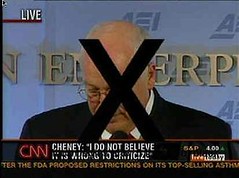Amir Taheri has some great thoughts on a withdraw from Iraq it’s timetable.
In the circles opposed to the toppling of Saddam Hussein one word is making the rounds these days: timetable.
Having failed to stop the war that liberated Iraq, and with their hopes of the insurgents marching triumphant into Baghdad dashed, they are now focusing on one issue: the withdrawal of the US-led coalition forces. Some want this to happen immediately, while others are prepared to grant a few weeks or months.
Those Democrat politicians in Washington, who had backed the war with as much enthusiasm as George W Bush, are now using the issue of withdrawal as a means of distancing themselves from their initial positions. The Arab reactionaries who shuddered at the thought of a despot being toppled by foreign intervention are now clinging to the withdrawal slogan in the hope of sabotaging the process of democratisation in Iraq. In Europe, professional anti-Americans of all ilks are trying to cover their political nakedness with the “ withdrawal” fig leaf.
The truth, however, is that a timetable has been in place from the first day of the war that ended the Ba’athist tyranny in 2003. In that timetable the coalition’s military presence in Iraq is, as it should be, linked to the programme for the nation’s political reconstruction. In other words the coalition forces are in Iraq to accomplish a precise political task and not to provide the United States or any other foreign power with a forward base in the Middle East.
The grand goal of that task was to take power way from a small clique ld by Saddam Hussein had hand it back to the people of Iraq. The idea was not to impose democracy on Iraq, as some anti-liberation circles claim. The idea was to remove impediments to the democratisation of Iraq. Today the Iraqis are not forced to create a democracy. But they have a chance to do so, if they so wish. The task of the coalition was to provide them wit that chance. And in that sense the Iraq project has been a tremendous success.
The task of giving the Iraqis that chance consists of a series of objectives many of which have already been attained, often in the teeth of diplomatic chicanery by the anti-liberation powers and nihilistic insurgency by the largest coalition of terrorists the region has seen in its recent history.
Any checklist would clearly show that the Iraq project has been more successful than Saddam nostalgics with to portray. The first objective, to bring down Saddam Hussein, was achieved in three weeks. The next objective was to break the apparatus of oppression created by the Ba’ath. Despite some residual problems that objective, too, has been achieved. Another objective was to break Saddam’s war machine that had been used against Iraq’s neighbours as well as the Kurds and the Shi’ites. After just three years nothing is left of that infernal machine.
One could continue the checklist with the formation of the Governing Council representing the first step towards the restoration of Iraqi sovereignty.
Next on the checklist we have the transfer of sovereignty to the Iraqis that was accomplished in June 2004.
That was followed by the formation of an interim government, a series of municipal elections, a general election leading to the formation of Iraq’s first pluralist government, the writing of a new constitution and a referendum to get it approved. The next item on the checklist is the general election scheduled for 15 December.
The checklist clearly shows that every objective included in the political programme has been achieved within the exact timeframe fixed by the new Iraqi leadership and its coalition allies.
A key element in all this has been the explicit understanding by both the Iraqi leaders and the coalition that no foreign troops will remain on Iraqi soil without the express agreement of the nation’s elected representatives. In other words the timetable for withdrawal already exists and the mechanism for starting it could be triggered by the parliament and the government that will merge from next month’s general election.
In fact the first item on the agenda of the next elected government, to be formed by next February at the latest, consists of a decision on the presence of coalition troops in Iraq. It was with that understanding that the United Nations agreed to end its largely negative stance on Iraq and play a role in helping the country in efforts to build a new political system.
The United States and all its allies in the coalition are equally committed to withdraw their troops if that is the express wish of the next elected parliament and government in Baghdad .
Iraqis from all ethnic, religious and political backgrounds are unanimous in their desire to see all foreign forces leave their country as soon as possible. The question that divides them is the timeframe within which withdrawal should take place.
With the exception of the Zarqawi gang and its residual Ba’athist allies, almost no one in Iraq wants an immediate withdrawal of he coalition forces. The Iraqis know that their country is located in a rough region with predatory neighbours that cannot be trusted. They see the presence of the coalition forces as a kind of insurance policy against even more brutal intervention in their affairs by several of Iraq’s neighbours.
The idea of a timetable for withdrawal from Iraq has been built into the entire project from day one. It was on that understanding that the Iraqi people chose not to fight for Saddam, thus allowing the coalition to win a rapid and easy military victory. That fact created a moral contract between the people of Iraq and the US-led coalition as co-liberators of the country. The Iraqi people’s part of the bargain was not to prevent the dismantling of the Ba’athist machinery of repression and war and to welcome the chance to build a new political system. The coalition’s part of the bargain was to protect Iraq against its internal and external enemies until it was strong enough to look after itself.
In the general election and the constitutional referendum held this year, the people of Iraq formally endorsed that contract. The coalition, for its part, must continue to honour that contract until new Iraq feels strong enough to bid farewell to its liberators.
That moment could come as early as next spring. But it could also take another year or two. My understanding of the situation in Iraq today is that the bulk of the coalition forces could be safely withdrawn within the next year.
The insurgency, which has already lost the political battle, is set to peak out in terms of the violence it is still capable of triggering against the Iraqi people. And if the recent performance of Iraq ’s new armed forces in a series of operations in two Western provinces is an indication, the Iraqis will be able to manage the insurgency on their own for as long as it takes to finish it off ..
What matters, however, is that it is up to the people of Iraq and its coalition allies to decide the moment an the modalities of the withdrawal It is a judgment that no outsider could make .. Those who opposed the liberation and those who have done all they could to undo it have no moral right to join that debate.

